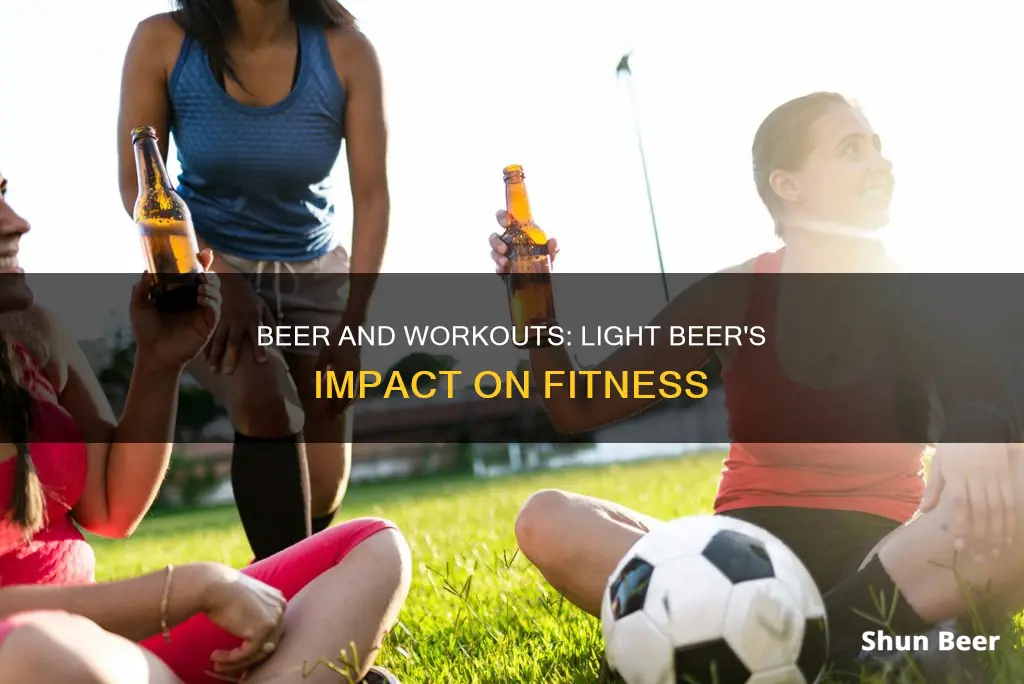
Drinking light beer after a workout is a topic of debate among fitness enthusiasts. While some argue that it can be a decent recovery aid, providing hydration and electrolytes, others claim that it can hinder muscle recovery and lead to dehydration. So, can you drink light beer on workout days? The answer may depend on various factors, including the amount and frequency of alcohol consumption, the intensity of the workout, and individual health considerations.
| Characteristics | Values |
|---|---|
| Alcohol content | 4% or above is likely to cause dehydration and other issues |
| Amount | One or two light beers is unlikely to be harmful |
| Timing | Drinking before exercise is not recommended; drinking after exercise can be beneficial for social bonding |
| Food | Drinking with food can reduce negative effects |
| Other drinks | Drinking with non-alcoholic beverages can reduce negative effects |
| Sleep | Alcohol can disrupt sleep, reducing the human growth hormone necessary for muscle repair |
| Weight gain | Alcohol contains 'empty calories' and can lead to weight gain |
| Electrolytes | Beer contains more electrolytes than spirits or wine |
| Recovery | Alcohol can negatively impact recovery, including increased muscle soreness and reduced muscle mass gains |
What You'll Learn

Light beer may be a good post-workout hydrator
Beer has carbohydrates and some sodium, which can be beneficial post-workout, according to Brad Schoenfeld, PhD, a Men's Health exercise science advisor and associate professor at Lehman College. It's also tastier than water, which may encourage you to rehydrate more.
However, it's important to remember that alcohol can be detrimental to performance if you drink too much. Jaison Wynne, a PhD student at Old Dominion University, says that once you go over 4% alcohol content, or have more than one or two 12-ounce low ABV beers, you risk issues including higher water loss, reduced muscle gains, less than optimal training, and potentially an increase in body fat.
Additionally, drinking alcohol after a workout can impair muscle recovery by interfering with protein synthesis, resulting in increased muscle soreness and reduced muscle mass gains. It can also disrupt sleep and reduce the secretion of human growth hormone (HGH), which is necessary for muscle repair and growth.
So, while light beer may be a good post-workout hydrator in moderation, it's important to be mindful of the potential negative effects and to consume it in conjunction with food and other non-alcoholic beverages to ensure proper rehydration and recovery.
Shotgunning Beer: How to Chug Instantly
You may want to see also

Alcohol can negatively impact muscle recovery
Additionally, alcohol consumption can cause an increase in cortisol levels and a decrease in testosterone levels, potentially leading to negative effects on reproductive health and shrunken testes in males, as well as affecting the female reproductive system. Alcohol consumption can also disrupt the balance of anabolic and catabolic hormones, impairing recovery and performance. Furthermore, alcohol provides empty calories, which can contribute to weight gain and negatively impact body composition for athletes.
While moderate alcohol consumption may not significantly impact muscle recovery for those exercising for fun or general fitness, it is important to consider the potential negative effects, especially for those with specific fitness goals or competitive sports involvement.
Beer Consumption Post-Gastric Bypass: What You Need to Know
You may want to see also

Drinking light beer may lead to nutritional imbalances
Beer is made from grains, which can be nutritious, but the brewing process reduces the nutritional content. Beer contains some B vitamins, folate, niacin, magnesium, and potassium, but these are present in much higher quantities in whole foods like fruits and vegetables. Therefore, relying on beer as a source of these nutrients can lead to nutritional imbalances.
Light beers tend to have fewer calories than regular beers, but this is not always the case. The term "light" can refer to reduced alcohol content, fewer calories, or both, and the exact nutritional profile varies among brands. Additionally, people may consume more light beer than they would regular beer, assuming it will have a milder effect, which can lead to increased calorie intake.
Drinking beer in moderation may have some health benefits, such as a reduced risk of heart disease and improved blood sugar control. However, these benefits are associated with moderate consumption of any type of beer, not specifically light beer. Furthermore, the potential benefits of moderate drinking can also be achieved through a balanced diet that includes whole foods.
Excessive alcohol consumption, including light beer, can lead to weight gain, liver disease, and an increased risk of certain cancers. Therefore, it is important to prioritise a nutritious diet and practice moderation when it comes to alcohol intake to maintain a healthy balance.
Clear Liquid Diets: Beer-Friendly or Not?
You may want to see also

Alcohol can cause weight gain
Drinking light beer on workout days is not necessarily a problem, but it's important to be mindful of how it may impact your body's ability to rehydrate and recover. If you're regularly playing competitive sports or working towards a specific fitness goal, it's worth considering the pros and cons of drinking alcohol. While the occasional beer isn't harmful, regular alcohol consumption could set you back if it causes hangovers or weight gain.
- Interfering with fat burning: Alcohol stops your body from burning fat. When you drink alcohol, your liver prioritises breaking it down instead of burning fat. This can lead to fat accumulation, especially in the abdominal region, resulting in what is commonly known as a "beer belly."
- High calorie content: Alcoholic beverages are high in calories, particularly "empty calories," which provide energy but lack nutritional value. Cocktails and mixed drinks can contain as many calories as a meal, and even light beer has about 100 calories per 12 ounces (355 mL). These excess calories can contribute to weight gain, especially if not accounted for in your daily calorie intake.
- Increased appetite and cravings: Alcohol can affect hormones that control appetite, hunger, and stress. It can make you feel hungrier and lead to cravings for salty, greasy, or high-calorie foods. This can result in poor food choices and increased calorie intake, further contributing to weight gain.
- Dehydration: Alcohol is a diuretic, which means it increases urine production and can lead to dehydration if not properly hydrated. Dehydration can impact your body's ability to recover from exercise and may affect your overall health and weight management.
While the relationship between alcohol consumption and weight gain is complex, and some studies have found varying results, regular heavy drinking is generally associated with weight gain over time. To maintain a healthy weight and lifestyle, it is recommended to consume alcohol in moderation or opt for low-calorie options like light beer. Additionally, pairing alcohol with food or non-alcoholic beverages and staying hydrated can help mitigate some of the negative impacts of alcohol on weight management.
The Magic Inside Beer Cartridges: How Do They Work?
You may want to see also

Alcohol can be beneficial for social bonding
Drinking light beer on workout days is generally not recommended, especially before a workout. Even a small amount of alcohol can affect your coordination, balance, and spatial awareness, increasing the risk of injury. However, having one or two light beers after a workout is not necessarily harmful and may even have some benefits.
Now, on to the topic of alcohol and social bonding.
A University of Pittsburgh study revealed that moderate amounts of alcohol, when consumed in a social setting, can enhance positive emotions and social bonding while reducing negative emotions. The study, titled "Alcohol and Group Formation: A Multimodal Investigation of the Effects of Alcohol on Emotion and Social Bonding," found that alcohol stimulates social bonding and increases the amount of time people spend talking to one another.
The researchers, led by Michael A. Sayette, assembled small groups of 720 male and female participants, who were randomly assigned to drink an alcoholic beverage, a placebo, or a non-alcoholic drink. The groups sat around a circular table and consumed three drinks in 36 minutes, and their facial expressions and speech behaviors were recorded and analyzed.
Results showed that alcohol increased the frequency and coordination of genuine smiles, creating "golden moments" where all group members smiled simultaneously. These groups also reported greater social bonding and were more likely to remain engaged in the discussion.
According to Sayette, the study highlights the importance of studying alcohol in social settings, as previous research often involved social drinkers consuming alcohol in isolation. The findings suggest that alcohol can enhance social interactions and create a more positive group experience, which could be beneficial for team-building or social events.
However, it is important to note that excessive alcohol consumption can have negative consequences and may impair judgment and coordination. As with most things, moderation is key when it comes to alcohol and social bonding.
Dented Beer Can Drinking: Safe or Not?
You may want to see also
Frequently asked questions
Drinking light beer on workout days is not recommended, especially if you are doing intense workouts or training for a competition. Alcohol can negatively impact your body's ability to rehydrate, repair muscles, and synthesise protein. However, if you are drinking in moderation and ensuring proper hydration and nutrition, the occasional light beer after a light workout is unlikely to cause significant harm.
Alcohol is a diuretic, which means it increases urine production and can lead to dehydration. This effect is more pronounced when consuming beverages with an alcohol content above 4%. Rehydrating after drinking alcohol may require up to twice as much water as you would typically need.
Alcohol can interfere with muscle recovery and protein synthesis, leading to increased muscle soreness and reduced muscle mass gains. It can also decrease testosterone and growth hormone levels, which are important for muscle repair and growth.







